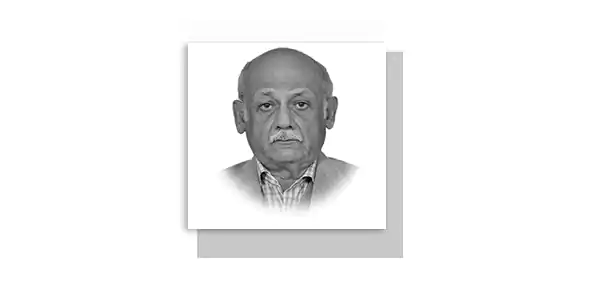SHEIKH Hasina Wajid, the iron lady of Bangladesh, daughter of the Bangabundhu Sheikh Mujib Ur Rahman, the founding father of Bangladesh, ruled the country with an iron hand for over 15 years.
Her rule bore the hall-marks of intolerance indecency, and disregard for democratic norms, nepotism and corruption. Sheikh Hasina ruled the roost with extreme arrogance and a strong belief that she was invincible and born to rule unchallenged. Her edifice of the power structure came tumbling down like a house of cards when the student’s movement against the quota system was transformed into a mass political movement culminating in a regime change in Dhaka.
The iron lady had to yield before the public demand and leave Bangladesh in a great hurry leaving all her supporters and political admirers in the lurch. Regime change in Dhaka has some very important lessons for rulers in other countries.
The Bangladesh economy under Sheikh Hasina was doing extremely well proved to be just a myth because the country today is burdened with huge debts, unemployment is rampant and prices of essential commodities are sky rocketing.
Economic performance is no guarantee of survival for any ruler and public anger and agitation can topple the most powerful and well entrenched government anywhere in the world.
Bangladesh under Hasina enjoyed the total support and cooperation of the Modi Government in India and had effectively become a satellite country of its powerful neighbour resulting in public anger. Bangladesh appeared on the map of the world in 1971 as a free democratic state after a terrible civil war. of Pakistan.
The Bangladeshi Constitution guarantees freedom of speech, freedom of worship and freedom of association.
During the long rule of Hasina Wajid all basic and fundamental rights of the people were trampled underfoot; Hasina was responsible for imposing a reign of terror, strict curfews, arrests of political opponents, ban on social media and giving extra powers to crush the students protest movement. She enjoyed absolute majority in parliament so a vote of no- confidence could not be moved against her so the only options for her removal were either to force her to resign or the Army should impose martial law.
It was the sheer power of the students and the will of the people of Bangladesh that resulted in the regime change when on August 5 2024 Sheikh Hasina made a hurried exit in a helicopter of the Bangladesh Army and sought refuge in India. Autocratic rulers of the world should learn a lesson from the happenings in Bangladesh.
It is very clear that the will and power of the people can topple even the most powerful dictatorial regime. Unity of the people can sweep away the most powerful and well-armed regime in no time. This regime change shows us that even without support from powerful forces like the military or the security agencies a public movement can destroy and topple even the most powerful rulers or regimes.
Throughout the reign of Hasina Wajid Bangladesh, was saddled with deepening domestic challenges notably increasing poverty, inequality, nepotism and severe corruption but the spin doctors of the regime continued to harp on the tune that everything is OK and the country is progressing by leaps and bounds but the bubble had to burst one day and the false propaganda of the government. controlled media could not prop up the regime.
The lesson for undemocratic forces of the world is that no amount of false propaganda can ensure the survival of a regime when there is a mass uprising and the people are in need of a change.
Severe economic crisis, unemployment, inflation, price spiral, increase in prices of gas and petroleum, increase in food prices, corruption are the reasons where the situation is just ripe for agitation or a mass political movement led by students, lawyers or the common political activists and this is exactly what happened in Bangladesh resulting in what has been called the second revolution and the sudden collapse of the Sheikh Hasina regime.
In any democratic society saddled with a dictatorship there has to be a catalytic agent for the success of a political protest movement this could be lawyers, students, union leaders or political activists.
In Bangladesh it was the students of Dhaka University and then students unions from all over the country. Sheikh Hasina was asking for it she had survived for 15 years but her Government was corrupt and incompetent and her regime had all the faults begging for a change.
When she came to power after the elections of 2024 which were called fraudulent elections it was predicted that she will rule for another five ears but the students movement swept her away like leaves in wintry weather. In this day and age we have a rather sad increase of intolerant regimes all over the world.
The happenings in Bangladesh were a result of sputtering growth amid a downturn in every sector except exports.
Sheikh Hasina, in sheer arrogance, refused to heed the warning signs and continued to believe that she can deal with any protest movement and quell any uprising against her rule. The strong will and determination of the students coupled with the support of the public forced her to flee the country and now the despotic rulers of the world should take note of this. If it can happen to Sheikh Hasina it could happen to them also.
A major lesson from Bangladesh revolution is that rapid GDP growth and huge exports alone cannot ensure across-the-board prosperity. When the benefits of economic growth do not trickle down to the common man and only the elite grow richer, most people see no improvement or find themselves even worse off.
The people then start to protest asking for a fair distribution of wealth and the national income resulting in a Bangladesh like situation.
—The writer is Professor of History, based in Islamabad.
Email: tariq.aqil@headstart.edu.p










